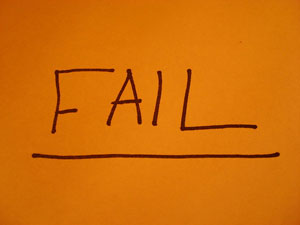
Flickr/<a href="http://www.flickr.com/photos/thehappyrobot/1413968365/">The Happy Robot</a> (<a href="http://www.creativecommons.org" target="_blank">Creative Commons</a>).
It’s generally a bad idea to publish your election predictions on the internet unless you’re Nate Silver. But I’m going to go out on a limb and say this much: right now, the 2010 midterms are looking really bad for Democrats.
In the Massachusetts special election scheduled for Tuesday, Scott Brown, a conservative Republican, has all the momentum, leads in the most recent poll, and looks set to win the seat once held by Ted Kennedy. This is in Massachusetts, people. If Brown beats Martha Coakley (who has run perhaps the worst campaign in recent memory), the state attorney general, health care reform probably won’t happen. The Democrats will have held a 60-vote majority for just four months, and the Republicans’ strategy of obstruction and delay will be vindicated. It will be their model going forward. Democrats will struggle to pass much of anything.
Even if Coakley pulls it out, the Dems have real problems. If you look at Silver’s list of the top fifteen Senate seats that are up-for-grabs in November, at least six Democrats appear to be in big trouble. North Dakota and Delaware seem to be in the bag for Republicans (unless Beau Biden gets in the Delaware race—and even if he did I think Mike Castle would still be the favorite.) Harry Reid in Nevada and Blanche Lincoln in Arkansas are deeply unpopular incumbents in purple states. They might hold on in a big Democratic year, but 2010 won’t be one. Mike Bennet looks to be struggling in Colorado. And party-switcher Arlen Specter could easily lose in Pennsylvania (which, after all, elected Rick Santorum just ten years ago). In the states where Republicans are playing defense, most of their candidates currently lead in the polls. Even Missouri—once thought to be the Democrats’ best chance for a pickup—seems eminently winnable for the GOP. And things just get better for them from there.
This looks to me like a miniature wave election, in which Democrats could lose six or so Senate seats (and Lieberman might switch) and 20 to 30 in the House. No governing party fares well while the economy is in the dumps, but with Democrats holding the presidency and both houses of Congress, they bear all the burden for the country’s economic woes. People are deeply resentful of the bank bailouts, and the establishment (read: incumbents) will feel the brunt of their wrath. And if you think the media narrative favors conservatives now, just wait until after the Republicans romp to a midterm victory.
Of course, there are many variables here, and a lot could happen between now and November. Maybe I’ll look back on this day from November and marvel at how wrong I was. But time is ticking away. Get ready for a bumpy 2010.










